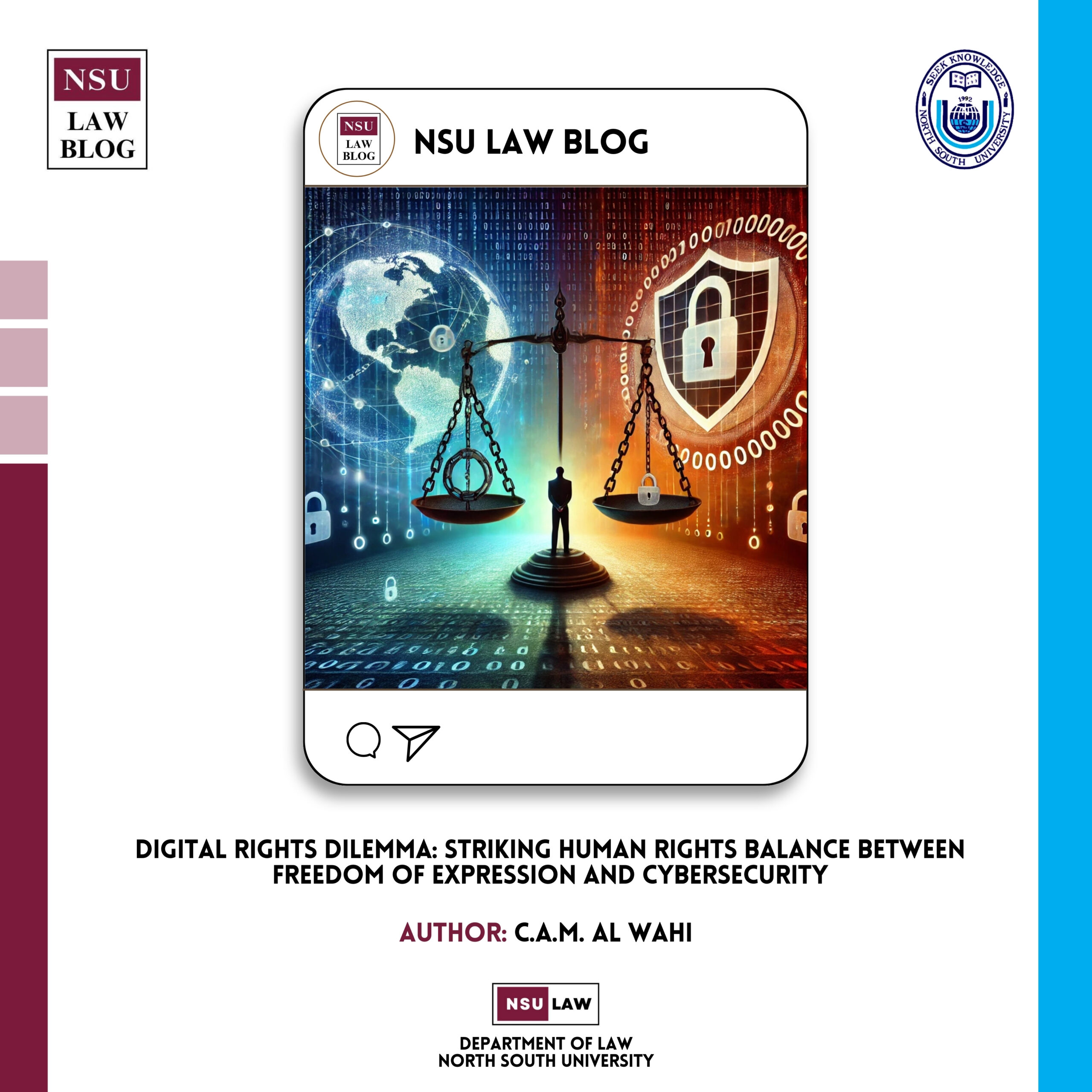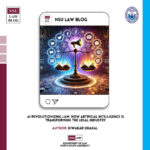Digital Rights Dilemma: Striking Human Rights Balance between Freedom of Expression and Cybersecurity

Bangladesh unveils itself at the center of navigating through the freedom of speech and cyber security in this era of technology. Due to the advancement of technology and modernization, it’s a challenge to safeguard human rights in retrospect of cyber security law which is underscored by the Universal Declaration of Human Rights (UDHR). Article 19 of UDHR uplifts the motto of human rights, noting – “Everyone has the right to freedom of opinion and expression.”
Regardless of the protection of human rights, the digital era has brought innumerable threats and risks that have made us probe to shield our basic human rights. Because cyber-related crimes and threats are increasing day by day worldwide, authorities and governments around the world are making laws and passing laws to make it stronger and more protective towards human rights and the welfare of humanity. Bangladesh is also not an exception, and following the security part for their civilians it has enacted the Cyber Security Act 2023. The purpose of these laws are to provide a bubble of protection around the citizens and institutions but more and more people are worried about how these laws might put a tape on the mouth to express innate feelings. To draw the boundary of digital rights is the most rigorous job for the government. It is the prime task of the government to find the right sense of balance to ensure the protection of human rights without violating human rights. The UDHR must be guided through as a convention to protect human rights as it acknowledges that there are some specific situations where human rights could have been limited. The Cyber Security Act 2023 now provides provisions and measures to protect fire from cyber threats but how much does it impact on digital rights. Not to stop people from expressing themselves legally, the law must be formulated without any ambiguous terms and unclear, vague provisions.
In Bangladesh, where the internet is an important source of media and the party solution of the civilians is at its peak, where the freedom of expression matters the most any violation of digital rights requires to be dealt with very meticulously. When the Cyber Security Act 2023 comes into force, the main agenda of it should be clear that while protecting civilians from cyber threats, it should not limit the political freedom of speech in the digital platforms. For the prevention of cybercrimes, the law has to be fully sealed and stern. Nonetheless, it is crucial that the act may not comply with the UDHR principles, but it still resolves the issues the civilians and experts are concerned about. To keep people from being under scrutiny too much the cyber security solution should act according to the principle of the demand of law and the monitoring legal system required to be followed as well.
With transparency and accountability, experts debate that the Cyber Security Act should comprise these basic principles. Human Rights to Know: Government Accountability in Data Operating and Cyber Security in a Democratic Society, the transparency of government actions is of paramount innuendo. People of a state have a fundamental right to be notified about how their data is being operated and how the government uses its powers in the field of cyber security. The protection of personal data has grown into a progressively pressing concern in the digital age. Article 21 of the UDHR focuses on the right to have a part in government and the right to access public service. Cyber Security Act, for the guarantee of constitutionality, our judiciary plays a vital role. Courts must be vigilant in conserving the rights promoted in the UDHR, acting as a check against any conceivable misuse of power in the name of cyber security. The digital rights problem can be solved by providing the knowledge to the people of how bad it could be for society and the country. The legal arena people must be well versed and informed in the both UDHR and Cyber Security Act details to safeguard human rights as well as digital rights.
A political science student at Jagannath University named Khadijatul Kubra was detained in 2020 under two cases of the Digital Security Act 2018 (DSA), charged with promoting anti-government statements and damaging Bangladesh’s reputation to the outside world. This case is a prime example of how to shut down criticism. Kubra was detained for 15 months before being released on bail, which raises serious questions about Bangladesh’s legal system’s balance of human rights and freedom of speech.
As a nation Bangladesh is facing a hard time striking the balance between freedom of expression and national security in digital rights. Bangladesh’s Cyber Security Act must be drafted with elements that are precisely accountable and committed to upholding the human rights that are basic for any human being along with the ethical foundation of UDHR. Bangladesh must consult with international corporations and bodies to combat cybercrimes, artificial intelligence crime hacking, identity theft and many more and provide specified and speedy trials tribunal.
To ensure that in enacting the cyber security measure in place Bangladesh does not curtails the basic human rights freedom of expression in involved business sectors, industrial sectors, society and government itself. It must include liberty to any sector of people. Can we together establish a digital human rights future incorporating all the essentials to protect human rights?

C.A.M. Al Wahi1 Posts
C.A.M. Al Wahi, a student at Bangabandhu Sheikh Mujibur Rahman Maritime University pursuing an LL.B. (Hons) in Maritime Law.


4 Comments
TT
October 12, 2024 at 7:16 PMVery well written. Keep up the good work brother🤍
TT
October 12, 2024 at 7:19 PMVery well written. Keep up the good work, brother🤍
Sadek Mohammad
October 12, 2024 at 7:20 PMWell written
Md. Al Mehedi Hasan Talukder
October 13, 2024 at 4:16 PMWell Done!